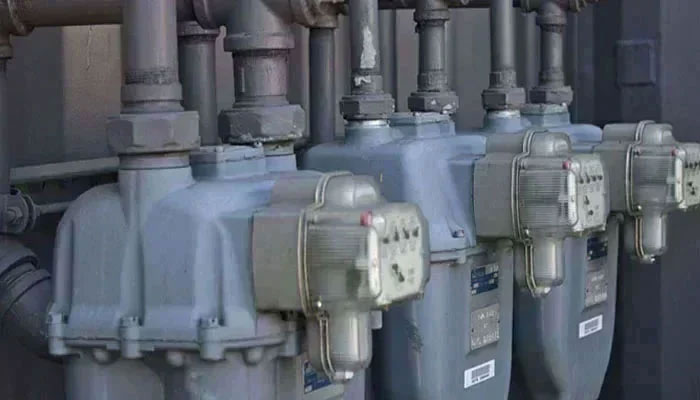Sindh asks Centre to reverse CCI decision on sale of 35pc gas
Sindh government asks Centre to convene CCI meeting for discussion and decision
ISLAMABAD: In a major development, the Sindh government has asked the Centre to reverse the CCI decision taken on January 29, 2024, under which exploration and production companies were allowed to sell 35 percent gas to private sector on auctioned prices by approving changes in the E&P policy 2012.
The Sindh government has asked the federal government to convene the CCI meeting for discussion and decision in the light of articles 172(3) and 158 of the Constitution.
“If the decision taken during the caretaker regime gets reversed, it would endanger the expected investment of $5 billion by E&P companies which they pledged to Prime Minister Shehbaz Sharif in their meeting two months back,” a senior official of energy ministry told The News.
The E&P companies, he said, are currently upbeat over the approval of Implementation Framework which 20-member task force, headed by Deputy Prime Minister Ishaq Dar, approved on November 18.
The framework was later okayed by prime minister before getting approval by Ecnec to enforce the amended E&P Policy 2012. The E&P companies linked investment with enforcement of amended E&P policy 2012.
However, according to the latest communication available with The News with federal secretary, the Secretariat of Council of Common Interests (CCI), Sindh government, pleaded the caretaker government was not legally and constitutionally empowered to take policy decisions which are not reversible by future elected government. These decisions may have effect or preempt exercise of authority by a future elected government.
Headed by the then caretaker prime minister Anwarul Haq Kakar, the government approved amendments to paragraph 9.4(2) under Section III of Petroleum (E&P) Policy, 2012. It stipulates E&P companies shall have the right to sell up to 35pc of their share of pipeline speciation gas to 3rd party having Ogra licence through competitive process. It needs no approval of government or any of its entity, provided the price(s) charged from 3rd parties would not be less than wellhead gas prices under the Petroleum Policy, 2012 for respective zones.
This provision will also apply to all the existing licences/leases granted under Petroleum (B&P) Rules 1986, 2001, 2009 and 2013 for gas discoveries which are not yet allocated.
The CCI further decided the province in which a wellhead of natural gas is situated should be given precedence in terms of Article 158 of Constitution.
The Sindh government drew the attention of CCI to Article 158 of the Constitution which stipulates the province in which a wellhead of natural gas is located should be given preference. Under the above arrangement, consumers of any province can participate in competitive bidding process for purchase of gas which is likely to raise its price for local bidders. They will then have to compete with higher prices offered by non-gas producing provinces.
The above situation will lead to violation of Article I58 of the Constitution which gives preferential right to people of the province where resource is located. More importantly, it is not the prerogative of caretaker regime to make any policy decision or amend the policy.
However, in the minutes of 51st meeting of CCI on January 29 this year with then caretaker prime minister in the chair, the then Sindh chief minister mentioned proposed amendments were vital for the industry. But the summary was not received timely and thus could not be examined properly. The decision in the matter may be taken in the next meeting of CCI. The then Sindh CM also recommended, as per Article 158 of the Constitution, preference of gas should be given to the province concerned over other parts of country.
-
 'Elderly' Nanny Arrested By ICE Outside Employer's Home, Freed After Judge's Order
'Elderly' Nanny Arrested By ICE Outside Employer's Home, Freed After Judge's Order -
 Keke Palmer On Managing Growing Career With 2-year-old Son: 'It's A Lot'
Keke Palmer On Managing Growing Career With 2-year-old Son: 'It's A Lot' -
 Key Details From Germany's Multimillion-euro Heist Revealed
Key Details From Germany's Multimillion-euro Heist Revealed -
 David E. Kelley Breaks Vow To Cast Wife Michelle Pfeiffer In 'Margo's Got Money Troubles'
David E. Kelley Breaks Vow To Cast Wife Michelle Pfeiffer In 'Margo's Got Money Troubles' -
 AI-powered Police Robots To Fight Crime By 2028: Report
AI-powered Police Robots To Fight Crime By 2028: Report -
 Everything We Know About Jessie J's Breast Cancer Journey
Everything We Know About Jessie J's Breast Cancer Journey -
 Winter Olympics 2026: What To Watch In Men’s Hockey Today
Winter Olympics 2026: What To Watch In Men’s Hockey Today -
 Winnie Harlow Breaks Vitiligo Stereotypes: 'I'm Not A Sufferer'
Winnie Harlow Breaks Vitiligo Stereotypes: 'I'm Not A Sufferer' -
 Apple Martin Opens Up About Getting 'crazy' Lip Filler
Apple Martin Opens Up About Getting 'crazy' Lip Filler -
 Why Did OpenAI Remove One Crucial Word From Its Mission Statement?
Why Did OpenAI Remove One Crucial Word From Its Mission Statement? -
 Prince William Warned His Future Reign Will Be Affected By Andrew Scandal
Prince William Warned His Future Reign Will Be Affected By Andrew Scandal -
 Amy Madigan Reflects On Husband Ed Harris' Support After Oscar Nomination
Amy Madigan Reflects On Husband Ed Harris' Support After Oscar Nomination -
 Is Studying Medicine Useless? Elon Musk’s Claim That AI Will Outperform Surgeons Sparks Debate
Is Studying Medicine Useless? Elon Musk’s Claim That AI Will Outperform Surgeons Sparks Debate -
 Margot Robbie Gushes Over 'Wuthering Heights' Director: 'I'd Follow Her Anywhere'
Margot Robbie Gushes Over 'Wuthering Heights' Director: 'I'd Follow Her Anywhere' -
 'The Muppet Show' Star Miss Piggy Gives Fans THIS Advice
'The Muppet Show' Star Miss Piggy Gives Fans THIS Advice -
 Sarah Ferguson Concerned For Princess Eugenie, Beatrice Amid Epstein Scandal
Sarah Ferguson Concerned For Princess Eugenie, Beatrice Amid Epstein Scandal




